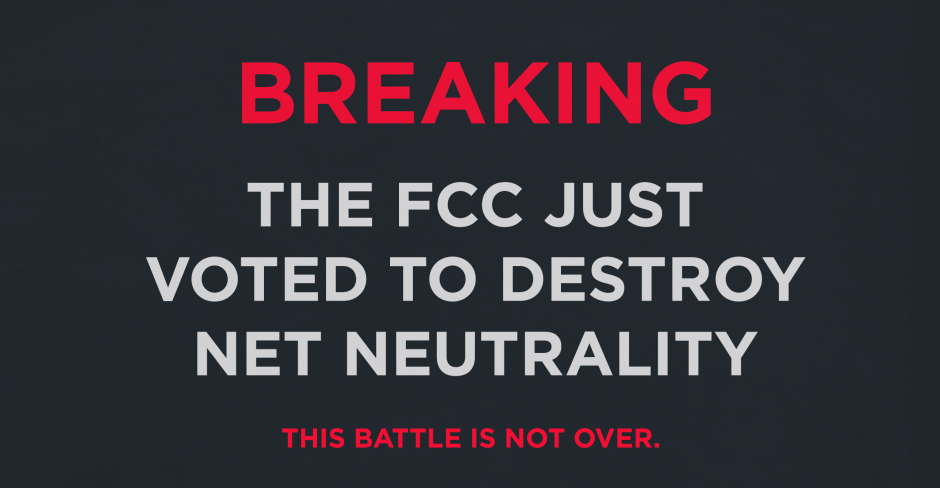Federal Communications Commission votes to repeal Net Neutrality rules
Vote comes amid study that over 83% of U.S. citizens oppose the decision, which will impact all Internet users and businesses
The Federal Communications Commission (FCC) has just voted to repeal the 2015 Open Internet Order, which established Title II Net Neutrality protections for consumers. Today’s decision represents a shocking abdication of the FCC’s responsibility over telecommunications and consumer protection, leaving Big Telecom in complete control over what citizens can do and see online.
The decision is a significant blow to the future of the Internet, free expression, democracy, and innovation. The FCC’s new framework allows Internet service providers (ISPs) to demand fees for prioritization, to throttle content and to even outright block websites — be they from competitors or because they don’t like, or don’t approve of, the content.
“Today’s vote is a needless assault on the Internet billions of people across the world have come to depend on,” said Katy Anderson, Digital Rights Advocate at OpenMedia.
“Internet users gravitated online because of the freedom and openness it provides — not because they’re looking for another version of Cable TV. The FCC’s plan turns the Internet’s level playing field into a tiered system with fast lanes and slow lanes — further separating those who pay, and those who can’t.”
Reversing Net Neutrality will also deeply harm the innovation the Internet has been known for from its inception. Small businesses and entrepreneurs with great ideas will no longer be able to compete on the merit of those ideas, instead corporations and favoured business partners of ISPs will have their web traffic prioritized, and medium-sized and smaller competitors will be slowed down or outright blocked completely.
“This means that the next revolutionary idea — the next Facebook, the next Netflix — will likely never be able to get off the ground. The loss of Net Neutrality will have a slow, insidious impact on the innovative spirit we’ve come to expect, and love, from the Internet,” Anderson continued.
The repeal of Net Neutrality has been slammed by both Republicans and Democrats in the U.S. Just this week a new poll was released showing that 83 per cent of Americans oppose the plan. The report, from the University of Maryland, highlighted that as many as three in four Republicans were against the plan, which was put forward by FCC Chairman Ajit Pai shortly after he was appointed.
“If Pai thinks he can get away with this, he’s been ignoring reality. Net Neutrality is a non-partisan issue and millions of people have been taking action, including more than 20 million comments submitted to the FCC and over one million calls made directly to Congress. Today does not mark the end of our fight for an open Internet, but renews the battle as all eyes and pressure now turn to Congress,” said Anderson.
The extremely unpopular ruling is expected to face several challenges, including lawsuits from digital rights advocacy groups and calls for investigation in light of alarming procedural deficiencies. The majority of Democratic members of Congress called for Pai to delay or stop this vote, including at least five Republicans, and on Wednesday 18 attorneys general joined the call to delay the vote.



 Take action now!
Take action now!
 Sign up to be in the loop
Sign up to be in the loop
 Donate to support our work
Donate to support our work